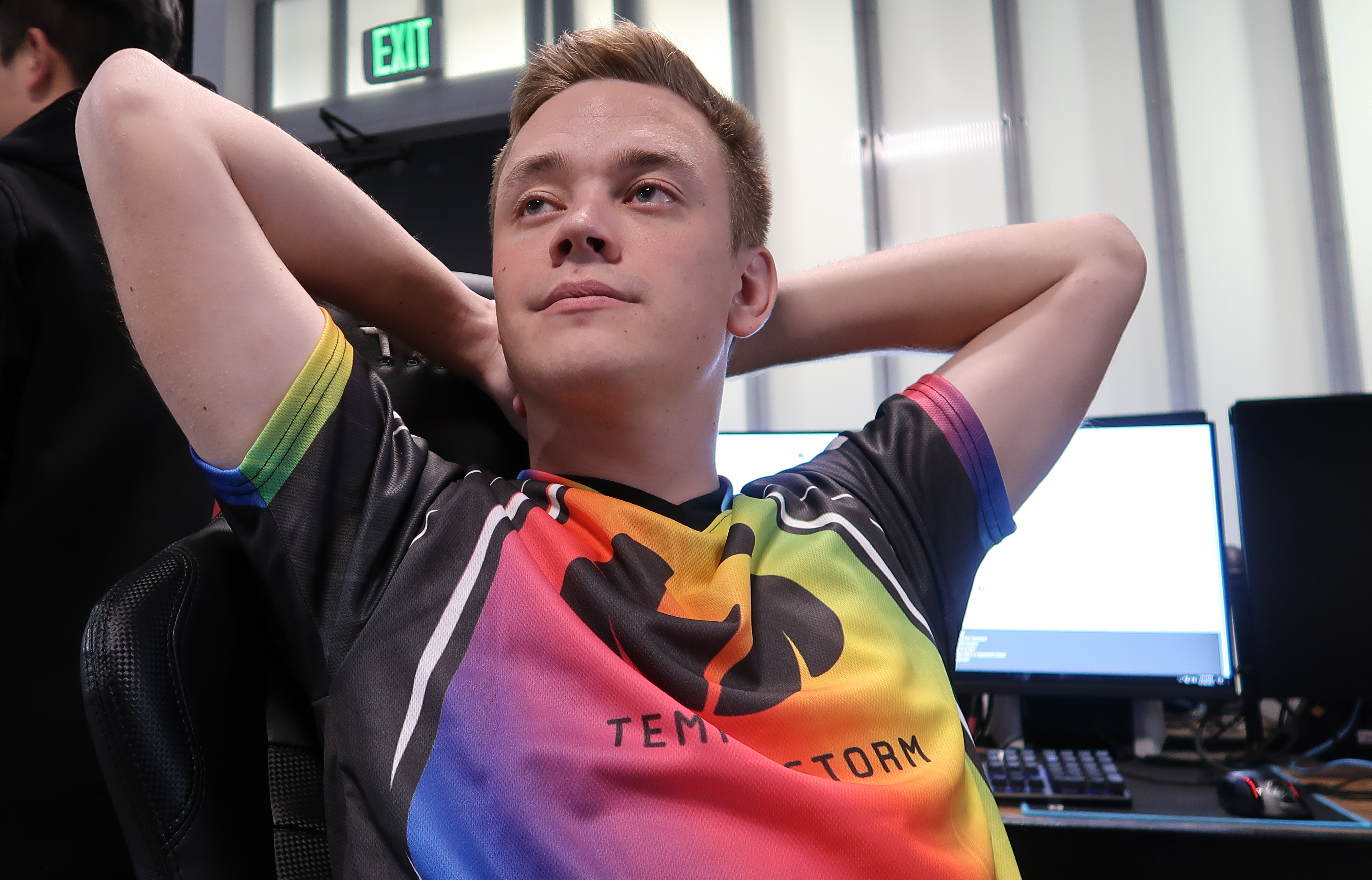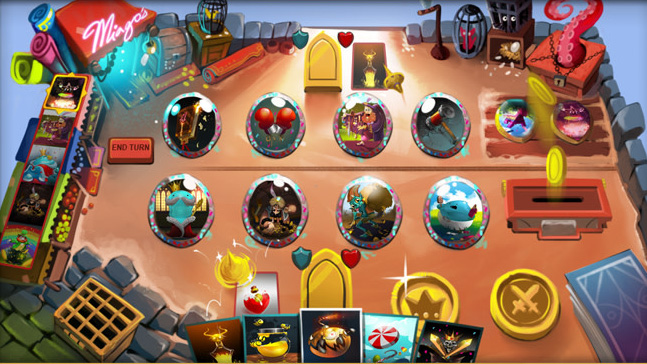Reynad on turning away from Hearthstone to make his own dream card game
The Tempo Storm entrepreneur, Twitch globetrotter, and these days only sometime ladder salt lord now has his own deck-builder in development.

I last spoke to Andrey "Reynad" Yanyuk in early 2017 for an interview about how the industrious 26 year-old was doubling down on his role as CEO of Tempo Storm, the esports org he founded, and slowly extricating himself from the Hearthstone scene. It's been almost a year since then, and the divorce is nearly complete. Today, Reynad has embraced the life of a globe-trotting IRL streamer—putting his camera to good use as he gets his guts punched out in a graffiti-stained Filipino boxing gym, or BMXs across Chilean rooftops, or skydives above Sydney, Australia.
It’s an interesting pivot for Reynad, a guy long considered to be Hearthstone’s saltiest streamer, (which is saying something, considering the competition.) The man's signature move was the long, baneful glance he'd give to the chat box after taking a bad beat, itching to hand out a permaban, or better yet a lengthy lecture to those watching, soundtracked by some furious mouse clicking.
From the outside, it often felt like the foundational Hearthstone personality/esports mogul was trapped in a prison of his own making, forced to engage with a game he was no longer passionate about. His turn on the Jake Paul path—charting the adventures of a young, tall, monied man taking a Phileas Fogg-style vacation—is obviously risky, and it's yet to be seen if it will pay off with the viewership he built up grinding ladder in his Huntington Beach, California front room, but I put it to him that he must be happier now. After all, he's outside and he's doing something new every day—it's just what the doctor ordered.
As it turns out, I'm half-right.
A lot of people look at what I have, but they don't see what I put in time and effort-wise.
—Reynad
"I don't know how to phrase it. A lot of people look at what I have, but they don't see what I put in time and effort-wise," says Reynad, from a Skype call, somewhere in Europe. "This is a much more stressful lifestyle than being at home playing Magic… I wouldn't say I'm happier, but I'm definitely more fulfilled right now."
This is the approach I've come to expect from Reynad. The man's prenatural dissatisfaction seems to fuel his drive for successes, even if it means he can't enjoy the little triumphs along the way. He is not the first streamer to get bored of the thing that made him famous, but he is one of the first to respond to that ennui by radically expanding the scope of his business, or even more ambitiously, by going toe-to-toe with Blizzard itself.
Yes, earlier this month, Reynad unveiled an Indiegogo campaign for a digital card game of his own design. It's called The Bazaar, and as of press time it's raised $59,000 of its $150,000 goal. Reynad has always spoken about how he's dabbled in game development throughout his youth, and now, without the pressure to stream Hearthstone daily while also running his sprawling organisation, he gets to bring that creative spark to life.
Keep up to date with the most important stories and the best deals, as picked by the PC Gamer team.
The Bazaar is a "deckbuilder," which means it's not going to play like Hearthstone, or Magic: The Gathering, or any other head-to-head CCG slugfest. If you're unfamiliar with the genre, deckbuilding was first innovated by the now-legendary board game designer Donald X. Vaccarino in his landmark 2008 game Dominion. Each player starts with a small, crappy deck of cards, and over the course of the game you generate currency to purchase additional cards to add to your pool. The goal is to end the game with an optimized deck that out-values and out-tempos your opponent until you hit a win condition (in Dominion, that means ending the game with more victory points).
This is obviously very different from Hearthstone, where you enter a match with all your cards assembled, and you know exactly what your game plan is from the first turn. Instead, deckbuilders test your flexibility and resourcefulness, rather than your knowledge of a particular rote matchup.
Reynad namechecks Ascension, a dungeon-crawler that masquerades as a card game, and Star Realms, a pocket-sized sci-fi dogfight that's about as close as a deckbuilder can get to something like Magic, as two of his influences. He's also clearly cognizant of the rampant success Blizzard has with Hearthstone, particularly the way the digital context of a PC unlocks mechanical ideas that can't be achieved in a paper game.
"We can design the core gameplay in a very different way," says Reynad. "Traditional deckbuilders struggle with the flavor element. The effects on the cards… you draw, you discard, maybe they're assigned a faction, but nothing has an intuitive flavor.
"In a digital space you can generate cards out of thin air and add them to your hand. It lets you do things you can't do on tabletop."

The finer details of how this will all work are up in the air. Reynad says there will be some in-game monetization, but instead of buying booster packs, you'll unlock specific classes and all the cards that come with them. There is also no word on a release date, though the Indiegogo campaign promises a working Alpha at $150,000, and a working Beta at $200,000. I'm also not entirely sure how Reynad regards this project on a macro level. It will be the first game published under the Tempo Storm banner, and I suspect that right now he's more interested in testing those waters, rather than pushing all his chips in. (Promoting the game through crowdfunding sure seems like a solid hedge.)
That being said, Yanyuk always knows how to self-promote, and held nothing back as we spoke.
Esports is very cyclical and every game has a lifespan. Hearthstone is beginning Stage Three, where the viewership begins to wane...
—Reynad
"It's the first time [Tempo Storm] had the resources to put something like this together, the marketing to support it, to create content around it," he explains. "Our business model long-term is more similar to Disney than it is the Lakers or the Yankees. Every esports team is going for that sports team model, we just see the esports division as a marketing division to push the projects we're working on. From the IRL streaming, to this game, to the merchandise."
This makes a lot of sense when you read between the lines. The vast majority of esports organizations and leagues operate at a net-loss. If a bubble is going to burst, the survivors will be the companies with the most diverse portfolios.
Storm on the horizon
Of course, Tempo Storm remains firmly entrenched in Hearthstone. The company still sponsors icons like Jeffrey "Trump" Shih, Dan "Frodan" Chou, and Haiyun "Eloise" Tang, and its competitive roster recently upgraded to include Muzahidul "Muzzy" Islam and William "Amnesiac" Barton—both of whom recently won substantial tournaments, and are considered among the very best players in NA. Reynad tells me he's proud of the talent he's assembled, but he doesn't necessarily predict a sunny future for Blizzard's CCG.
"Esports is very cyclical and every game has a lifespan. Hearthstone is beginning Stage Three, where the viewership begins to wane, and it gets down to that core player-base," he forecasts. "That's why we're focusing on things that have more potential for growth. I want to do something cool. I think I have the skills for it."
And so, this is where we find Reynad in 2018. More mecurial than ever, running a multi-dimensional gaming brand in between the YouTube stunts and blue-moon tournament appearances. "It's time-consuming, but the company is built in a way where if I need to step away for awhile, it can run on its own," he says, when I ask him about all the time he's spending outside of the office.
Reynad continues to be one of the most fascinating figures in games. Someone who recognized early the value of the influence he's accrued, someone who will keep pushing until he finds the wall, someone with both the breathtaking audacity to diagnose Hearthstone as a game in decline, and the brazenness to swoop in with his own home-cooked design. Beneath the prickly exterior, the restless ennui, and the low-rolled Spiteful Summoners, Reynad remains an optimist. He either doesn't fear failure or believes he can't lose. Why not? It's worked so far.

Luke Winkie is a freelance journalist and contributor to many publications, including PC Gamer, The New York Times, Gawker, Slate, and Mel Magazine. In between bouts of writing about Hearthstone, World of Warcraft and Twitch culture here on PC Gamer, Luke also publishes the newsletter On Posting. As a self-described "chronic poster," Luke has "spent hours deep-scrolling through surreptitious Likes tabs to uncover the root of intra-publication beef and broken down quote-tweet animosity like it’s Super Bowl tape." When he graduated from journalism school, he had no idea how bad it was going to get.

